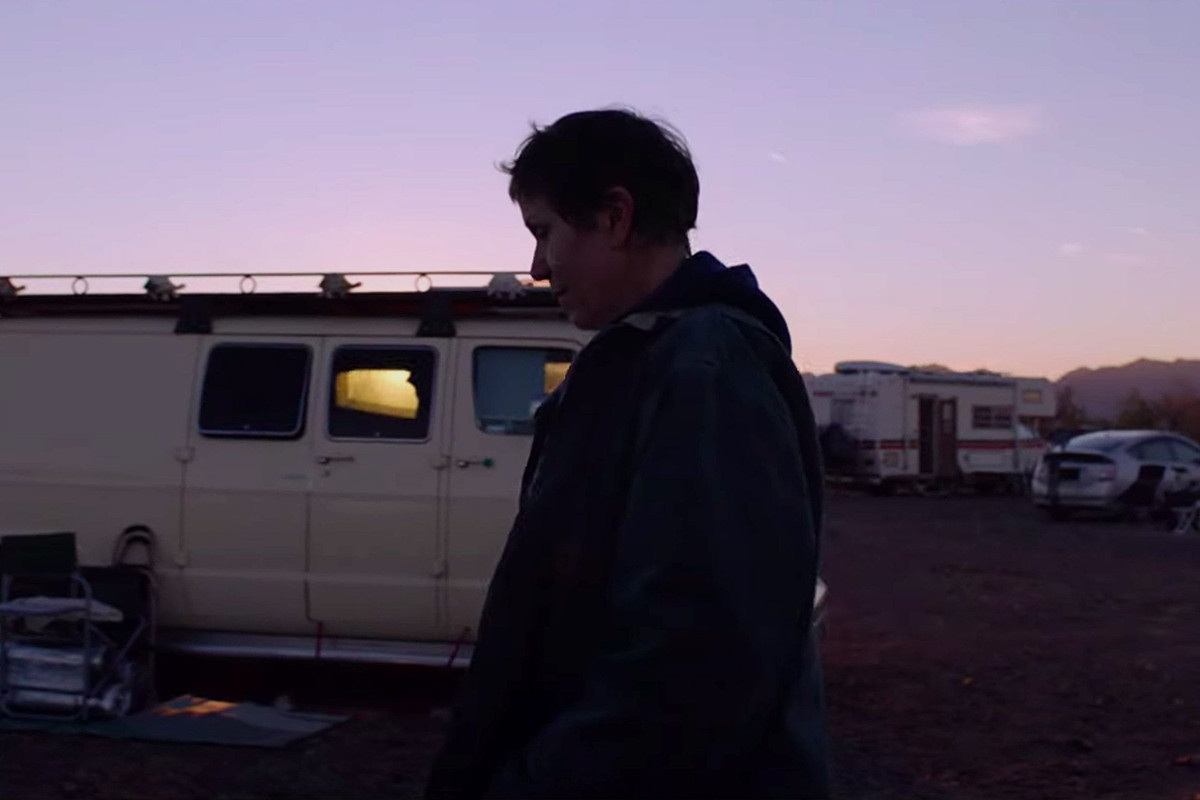Dir: Chloé Zhao
Having made her name with two films with entirely non-professional casts, and next heading over to Marvel for The Eternals, writer-director Chloé Zhao doesn't depart much from the loose narrative and semi-documentary style of her earlier films for her first piece with well-known actors (Frances McDormand and David Strathairn) in the leads.
Fern (McDormand) is in her early 60s and recently widowed. The town where she and her husband lived and worked for years has essentially dropped off the map, killed when its largest employer - a quarry - closed. Now Fern lives in her van, moving from place to place and temp job to temp job, running across people living much the same nomadic life as she goes.
Much of Nomadland is positively funereal, in mourning for an America dying thanks to end-stage capitalism and showing the exploitative grind of the march from one unstable job to the next, just to earn enough to meet basic needs (and sometimes not even that). Odd, then, that it should begin with a largely uncritical sequence of Fern working at an Amazon warehouse, praising the wages in the dialogue and not even hinting at the hideous working practices that have been credibly reported on. Other jobs are shown as the hard graft they are. The one Zhao gets the most out of visually is when Fern is helping pick beets. We see the machines churning, the physical labour, Fern dwarfed by a huge pile of the vegetables and her showering off a layer of dirt afterwards. It probably the most effective passage of the film in depicting the way industry churns through these workers, but it's also a point that has already been made more than a few times before this point. Sometimes, work is leavened by the company of Fern's fellow travelers, notably Dave (Strathairn). In another movie, he might be a love interest, but here the lines are clear, Fern hasn't taken off her wedding ring and isn't looking for anyone to take the place of her husband.
The selection of non-professional actors playing the other denizens of the road, some rotating in and out as Fern re-encounters them, others appearing just for their one moment, are easily the most interesting aspect of Nomadland. While it has to be stressed that Frances McDormand is fantastic as Fern, giving a naturalistic performance that is totally unselfconscious, it can't be denied that when she's placed next to the obviously real stories and experiences of the non-actors in the cast (for instance, one heartbreakingly relating how he's managed to get up each day for the five years following his son's suicide) it's obvious that what McDormand is doing is acting. She's impeccable, but she simply can't fake (nor, likely, could anyone) the lived-in reality of what comes from her co-stars. This is most prevalent as an issue in the sequence that finds Fern rolling up at Dave's family's house for Thanksgiving. It's a rare moment in the film that feels plot-driven and where the dialogue seems more out of a conventional movie. It's not a bad sequence, and it's notable that Fern seems as uncomfortable in it as it feels in the film, but it still sticks out like a sore thumb.
If nothing else (and it's plenty else) Nomadland is beautiful. Cinematographer Joshua James Richards, who also photographed Zhao's first two films, makes the landscape one of the film's most compelling characters. His images capture the desperate cold of the winter months when we first find Fern sleeping in her van, the almost alien landscape of the desert where Fern wanders off rather than stay for the tour Dave is giving and the lonely, frozen in time, interiors of the abandoned town of Empire, among others, with an eye that not only creates gorgeous images but asks us to think about how Fern and others are situated in them.
I wonder whether Zhao's film would be more effective and more affecting if it were pure documentary. The moments that tug hardest and most organically at the heartstrings are often silent images and montages that communicate the film's message about these people either as cogs in the workflow machine or as outliers who have chosen to step away from it. The point is well taken, but it's also made early and not really elaborated on thereafter. The rest of the great moments are those completely real and unguarded conversations that come straight out of real life, and while there's nothing especially wrong with Fern's story within the film, I'm not sure it adds much to the effectiveness of either of those great things.
★★★


No comments:
Post a Comment